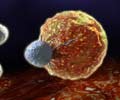Scientists identified mechanisms governing immune cells, selectively removing troublemakers to reshape skin immunity. Benefits those with psoriasis, vitiligo.

Divergent molecular networks program functionally distinct CD8+ skin-resident memory T cells
Go to source) Human skin is packed with specialized immune cells that protect against infections and cancer and promote healing. These cells, called tissue-resident T cells or TRM cells, stay in place to fight infections and cancerous cells in the skin. However, when not controlled properly, some of these skin TRM cells can contribute to psoriasis and vitiligo.
Groundbreaking Findings on Skin TRM Cells' Control Mechanisms
This research is the first to describe the unique elements that control various types of skin TRM cells in animal models, offering precise targets for potential treatment strategies, said lead first author Dr. Simone Park, from University of Melbourne's Doherty Institute in Australia.TOP INSIGHT
Study unveils distinct controls over skin-resident T cells in animals, pinpointing precise targets for psoriasis and vitiligo. #skindisorders #psoriasis #vitiligo #skindisease
In the study, published in the journal Science, the research team harnessed this new knowledge to eliminate 'problematic' cells that can drive autoimmune disorders, while preserving the 'good' ones that are essential to maintain protective immunity. The findings could pave the way for more precise and long-lasting therapies for skin disease.
"Skin conditions like psoriasis and vitiligo are difficult to treat long-term. The T cells driving disease are hard to remove, so patients often need life-long treatment. Our approach has the potential to revolutionize the way we treat these skin disorders, significantly improving outcomes for people dealing with challenging skin conditions," said Professor Laura Mackay, Laboratory Head and Immunology Theme Leader at the Doherty Institute.
With the study demonstrating successful removal of specific skin T cells in animal models, further research is necessary to validate the efficacy of these strategies in human subjects. Dr. Park hopes the study will inspire the development of new treatments for skin disease. "These discoveries bring us one step closer to developing new drugs that durably prevent autoimmune skin disorders without compromising immune protection," said Park.
Reference:
- Divergent molecular networks program functionally distinct CD8+ skin-resident memory T cells - (https://www.science.org/doi/10.1126/science.adi8885)
 MEDINDIA
MEDINDIA




 Email
Email










